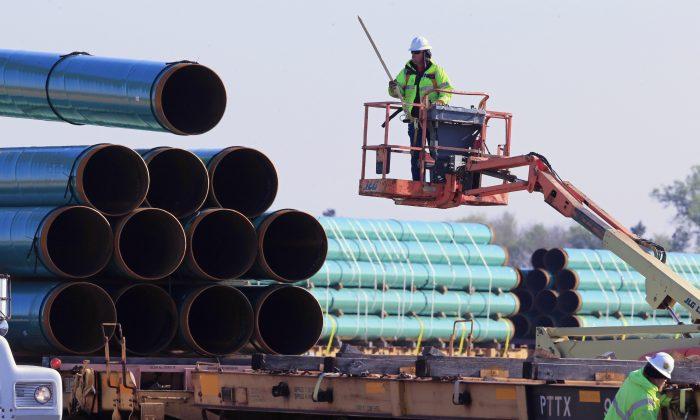SEATTLE—A proposed pipeline-expansion project in Canada will put the fishing rights and cultural heritage of U.S. tribes at risk, a lawyer representing several Washington state tribes told Canadian energy regulators.
Kinder Morgan’s Trans Mountain project would nearly triple pipeline capacity from 300,000 to 890,000 barrels of crude oil a day. It would carry oil from Alberta’s oil sands to the Vancouver area to be loaded on to barges and tankers for Asian and U.S. markets. The project would dramatically increase the number of oil tankers that ply Washington state waters.
“This project will harm the cultures of the U.S. tribes,” said Kristen Boyles, an Earthjustice attorney who spoke against the project Friday on behalf of the Swinomish, Tulalip, Suquamish and Lummi tribes. She made final arguments to Canada’s National Energy Board at a hearing in Burnaby, British Columbia, which was broadcast online.
Boyles told the three-member panel that project officials didn’t consult with the U.S. tribes and didn’t consider the impacts to the tribes. “This project is all risk and no reward,” she added.
Ecology officials have said the project should require all vessels and barges to have tug escorts. It should also be required to help pay for and develop a response plan to address the risks of vessels carrying diluted bitumen, as well as show evidence it can pay for response and damage costs if a spill happens.
Trans Mountain has agreed to make it a requirement that tankers accepted at the Vancouver terminal have enhanced tug escort from the terminal to the west entrance of the Strait of Juan de Fuca, according to Pilkey-Jarvis.
Northwest tribes say increased vessel traffic poses a safety risk to fishermen and could have disastrous impacts on tribal fishing areas that are protected by its treaty with the U.S. They say the fisheries are important not only to jobs and livelihood but that it plays a major part of their self-identity.
“We are speaking directly to the Canadian regulators to highlight the risks of this pipeline to our lives, our culture, and the priceless waters of the Salish Sea,” Swinomish Chairman Brian Cladoosby said in a prepared statement.
Environmental groups also worry about the environmental impacts to the small endangered population of orcas that spend time in Washington state and Canada waters.
The energy board is scheduled to make its recommendations on the pipeline expansion by May 20.





